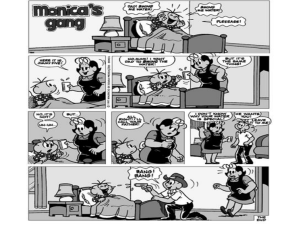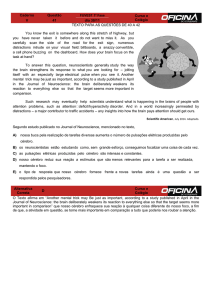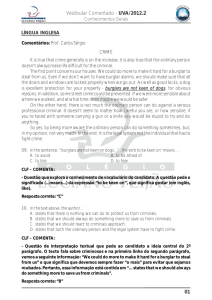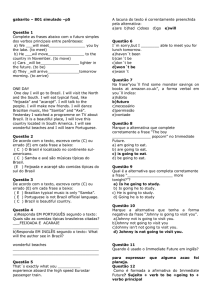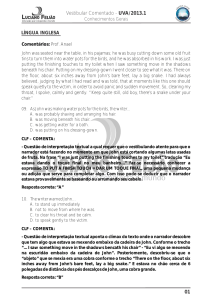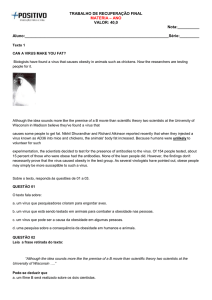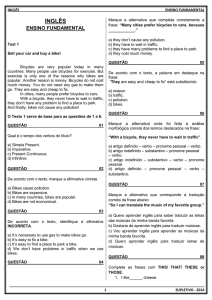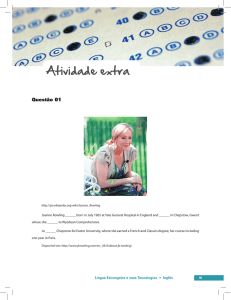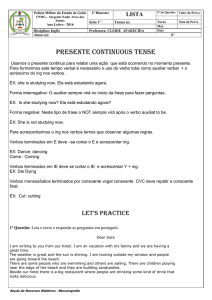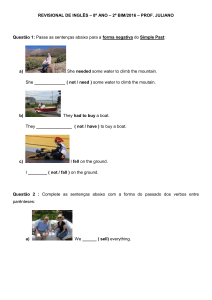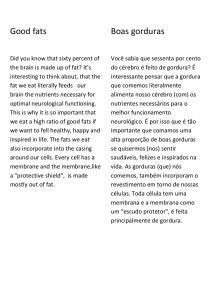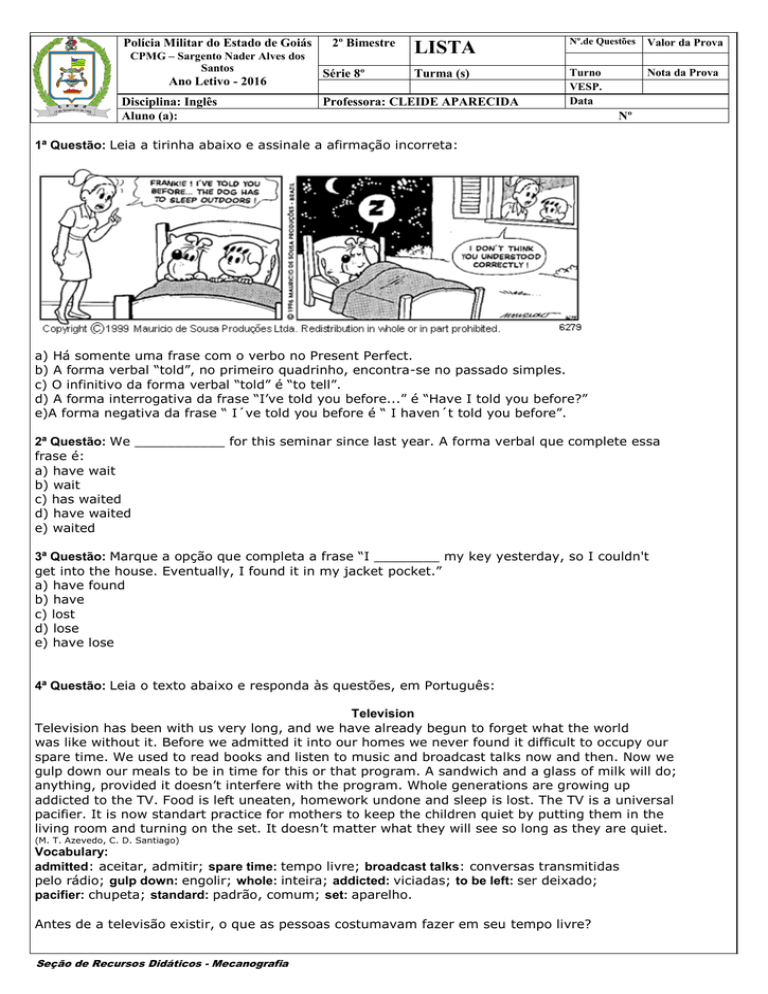
Polícia Militar do Estado de Goiás
CPMG – Sargento Nader Alves dos
Santos
Ano Letivo - 2016
Disciplina: Inglês
Aluno (a):
2º Bimestre
Série 8º
LISTA
Nº.de Questões
Valor da Prova
Turma (s)
Turno
VESP.
Data
Nota da Prova
Professora: CLEIDE APARECIDA
Nº
1ª Questão: Leia a tirinha abaixo e assinale a afirmação incorreta:
a) Há somente uma frase com o verbo no Present Perfect.
b) A forma verbal “told”, no primeiro quadrinho, encontra-se no passado simples.
c) O infinitivo da forma verbal “told” é “to tell”.
d) A forma interrogativa da frase “I’ve told you before...” é “Have I told you before?”
e)A forma negativa da frase “ I´ve told you before é “ I haven´t told you before”.
2ª Questão: We ___________ for this seminar since last year. A forma verbal que complete essa
frase é:
a) have wait
b) wait
c) has waited
d) have waited
e) waited
3ª Questão: Marque a opção que completa a frase “I ________ my key yesterday, so I couldn't
get into the house. Eventually, I found it in my jacket pocket.”
a) have found
b) have
c) lost
d) lose
e) have lose
4ª Questão: Leia o texto abaixo e responda às questões, em Português:
Television
Television has been with us very long, and we have already begun to forget what the world
was like without it. Before we admitted it into our homes we never found it difficult to occupy our
spare time. We used to read books and listen to music and broadcast talks now and then. Now we
gulp down our meals to be in time for this or that program. A sandwich and a glass of milk will do;
anything, provided it doesn’t interfere with the program. Whole generations are growing up
addicted to the TV. Food is left uneaten, homework undone and sleep is lost. The TV is a universal
pacifier. It is now standart practice for mothers to keep the children quiet by putting them in the
living room and turning on the set. It doesn’t matter what they will see so long as they are quiet.
(M. T. Azevedo, C. D. Santiago)
Vocabulary:
admitted: aceitar, admitir; spare time: tempo livre; broadcast talks: conversas transmitidas
pelo rádio; gulp down: engolir; whole: inteira; addicted: viciadas; to be left: ser deixado;
pacifier: chupeta; standard: padrão, comum; set: aparelho.
Antes de a televisão existir, o que as pessoas costumavam fazer em seu tempo livre?
Seção de Recursos Didáticos - Mecanografia
______________________________________________________________________________
______________________________________________________________________________
De acordo com o texto, o que as pessoas deixam de fazer para assistir televisão?
______________________________________________________________________________
______________________________________________________________________________
Segundo o texto, a televisão tornou-se uma “chupeta universal” (universal pacifier). Explique.
______________________________________________________________________________
______________________________________________________________________________
O que significa a expressão “Will do” na frase: “A sandwich and a glass of milk will do”?
______________________________________________________________________________
5ª Questão: Assinale a opção que completa a frase: “She _______ that movie yet.
a) don’t seen
b) haven’t seen
c) have seen
d) hasn’t seen
e) hasn’t seed
6ª Questão: Complete o texto com o Simple Past ou Present Perfect dos verbos entre
parênteses
7ª Questão: Observe as charges abaixo e faça o que se pede:
a) Copie a frase que está no Present Perfect.
_________________________________________________________________________
b) Escreva a frase que você copiou na letra a na forma negativa.
_________________________________________________________________________
Seção de Recursos Didáticos - Mecanografia
c) Escreva a frase da letra a na interrogativa.
_________________________________________________________________________
d) Copie a frase que está no Past Perfect.
_________________________________________________________________________
8ª Questão: Mude as frases para a forma negativa e interrogativa. Observe os tempos em que
os verbos estão.
a) John has moved to Canada.
Neg.: ___________________________________________________________
Int.: ____________________________________________________________
b) The neighbors noticed everything.
Neg.: ___________________________________________________________
Int.: ____________________________________________________________
c) He was a silent man.
Neg.: ___________________________________________________________
Int.: ____________________________________________________________
9ª Questão: Assinale a alternativa que contém o particípio dos verbos: to go, to take, to be, to
make:
a) went, took, was, made
b) gone, taken, been, made
c) gone, took, been, maden
d) went, taken, were, made
e) gone, token, been, maden
10ª Questão: Use when ou while
a) She was sleeping ____________ I arrived.
b) They were drinking coke _________________ I was eating a sandwich.
c) They are playing _____________ She was studying math.
d My mother was prepared the dinner __________________ my sister finished clean her room..
Seção de Recursos Didáticos - Mecanografia

